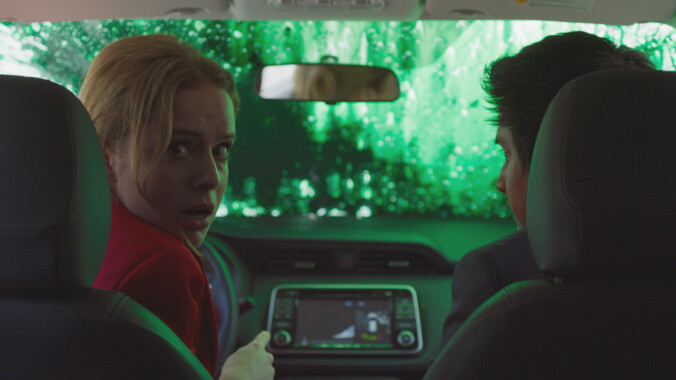Repugnant revolution thriller New Order stirs only the gag reflex


In his latest film, New Order, Mexican director Michel Franco (Chronic, After Lucia) displays all the style, sensibility, and efficiency of a meat grinder. The opening act is promising enough, observing as some of Mexico City’s wealthiest and most well-connected, gathered together for a posh wedding reception, begin to feel the faint reverberations of political unrest unfolding outside their immediate purview. But about 20 minutes in, once armed protestors interrupt the festivities, the film becomes populated not so much by characters as bodies to be brutalized, and things quickly spiral into violent chaos. A montage surveying the destruction lingers on a visibly pregnant woman with a bullet in her stomach, and it’s typical of Franco’s approach that while we don’t see the act, he makes damn sure we picture it on our heads and get a good, long look at the aftermath. If nothing else, New Order demonstrates that the line that separates festival-lauded arthouse films from crass exploitation fare can be very thin indeed.
Marianne (Naian González Norvind), the 25-year-old bride-to-be and the closest thing the film has to a protagonist, actually manages to avoid this initial carnage. Before the violence began, she’d left her own wedding to go after Rolando (Eligio Meléndez), a former employee who’d come to the family for help with an urgent medical bill; her mother and brother had turned him away. But as Franco’s script operates under the principle that no good deed goes unpunished, suffering still awaits Marianne. The day after that initial uprising, some soldiers pick her up on the pretext of taking her home, only to bring her to a holding facility where she and other one percenters are held for ransom, systematically tortured, and raped. In one scene, we see masked soldiers about to sodomize a man with a cattle prod.
There does seem to be a purpose to all this. Following Marianne’s capture, we skip forward a month to a point of uneasy political equilibrium, only to find things unchanged in some crucial ways. Marianne’s surviving family and fiancé still live in their old homes and seem no more financially hard up than before, while Rolando and his family, for their part, are if anything worse off. Franco intentionally keeps the macro details of governance rather vague, but whoever is in control, things basically look and function like a totalitarian, military-backed state. So at least one thing is clear: The new order has simply consolidated the old one.
Insofar as New Order has a point, then, it’s that any popular uprising risks being co-opted by corrupt, fascist forces. Hence, perhaps, why the working-class rebels—predominantly dark-skinned, while the wealthy family is light-skinned—are here treated like an undifferentiated, undirected mass of revolutionary energy. This sort of cynicism is arguably conservative, even pernicious. But however one construes Franco’s politics, the much larger problem is that he tries to sidestep the pesky how of it all. Building a dystopia requires actual imagination, and New Order evinces little of that. For all of its apocalyptic foreboding, the film is curiously vague on the details of how anything really functions in this New Order, and there’s precious little sense of what it’s like to actually live under it from day to day. There are lines for water and food, mostly, it seems, because those are the kinds of things that one finds in a dystopia. By the end, the ill-defined situation feels like little more than a pretext for cramming as much savagery as possible into 88 minutes.
Franco seems to have taken Jean-Luc Godard’s oft-quoted (and oft-abused) dictum, “It’s not blood, it’s red,” as license to slather his canvas with all manner of lurid detail. But to borrow from the French director’s more recent The Image Book, there is such a thing as the violence of the act of representation—and Franco, for his part, seems only too unbothered by this. Filmmakers like Michael Haneke, Gaspar Noé, and Lars von Trier are often condemned for being pointlessly provocative, for practically daring viewers to turn away with scenes that threaten to break their films (and sometimes do). A movie like New Order elicits an arguably tougher charge: For all of its horrific violence, it does its damnedest to keep you watching. Its logic is a kind of calculated, ritualized sadism, making sure we know just how bad things are, while also cutting away before the worst of it.
To be clear: New Order wouldn’t necessarily be a better movie if Franco had chosen to linger on the most appalling moments of violence. But what his shock-and-awe tactics demonstrate is a marked unwillingness to think through the ramifications of what he’s presenting. We routinely and rightly scrutinize depictions of war and the Holocaust for how they handle and represent atrocities—for while fidelity to the historical record isn’t the rule, artists do have some sort of ethical responsibility in how they choose to portray past horrors. It doesn’t follow, though, that all methods are therefore permissible under the cover of speculative fiction. And there seems little reason why New Order, despite being set in the near-future as opposed to the historical past, shouldn’t be held to a similar level of scrutiny as, say, Schindler’s List. (Certainly, some of the imagery Franco deploys—such as of Marianne and her fellow prisoners naked and huddled together amid a tiled shower room—is no less charged.)
What New Order offers, ultimately, is a kind of stupid realism: Everything could happen and is therefore “true” (read: important), but it’s also just speculative, so don’t fixate on the details. The brutality of New Order’s dystopian Mexican state may be hypothetical, but Franco’s sordid manipulations are all too real.